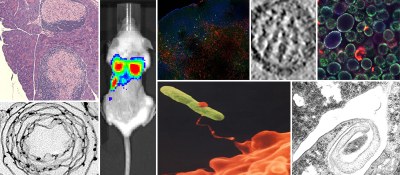Message From the Interim Chair
It has been my privilege to be the interim chair when our charismatic leader, Dr. Egilmez decided to step down. I am honored to have been given this important assignment and to have the opportunity to work with an outstanding group of faculty, staff and students. Despite the challenges posed by the adaptation of the new funds flow methodologies at the School of Medicine, the department is in a fiscally and academically strong position. Indeed, the changes in leadership at all levels of the University administration allowed us to be recognized as a very strong department with a resilient grant portfolio. The four new faculty members recruited in 2022, Drs. Jian Zheng (Assistant Professor), Sharmila Nair (Assistant professor), Ryan Doster (Assistant Professor, joint appointment) and Irina Kirpich (Professor) have greatly expanded our research portfolio in viral immunology, cancer, mucosal microbiota/infections and alcohol-induced liver disease. On a separate note, our faculty have done an outstanding job in teaching graduate, medical and dental students across the campus and garnered awards and leadership roles in medical education.
Items of Interest
Graduate Programs: M.S., Ph.D.
Final Application Deadline: March 1
Full consideration Deadline: January 15
Center for Functional Microbiomics, Inflammation and Pathogenicity
Student Highlights
PhD graduate Easton Ford has won this year's John M. Houchens Prize for Outstanding Dissertation.
Easton graduated with his doctorate in Microbiology and Immunology under the mentorship of Associate Professor Melissa L. Smith.
As a graduate student, he has played a key role in the development of innovative genomic long-red sequencing technologies for studying antibody repertoires and other immune loci, while also mentoring and training students in various areas around the lab. Learn more about Easton and his work at: uofl.me/commencement-awards
M&I PhD Candidate Presented at Neutrophil 2024 in Germany
Katelyn Sheneman, a M&I PhD candidate in the laboratory of Dr. Matthew Lawrenz, presented at Neutrophil 2024 in Germany. Congratulations, Katelyn!
M&I PhD Student Invited to Speak at the 2024 MMPC
Denny Gao, a M&I PhD student in the laboratory of Dr. Gill Diamond, was invited to speak on the topic “Active Vitamin D Reduces ACE2 Surface Levels and SARS-CoV-2 Viral Entry” at the 2024 MMPC. Congratulations, Denny!
M&I Graduate Student Wins 1st Place Masters Basic Science Graduate Student Award
Sayra Moni, a graduate student in Dr. Kevin Sokoloski’s laboratory, won the 1st Place Masters Basic Science Graduate Student Award at Research! Louisville 2024. Congratulations, Sayra!
M&I PhD Candidate Wins Best Trainee Talk Award
Christopher Farrell, a M&I PhD candidate in the laboratory of Dr. Ryan Doster, won the award for Best Trainee Talk at the 2024 ASM Joint Branch Meeting of South Central and KY-TN Branches. Congratulations, Christopher!
M&I PhD Candidate Published Paper in Oxford
Deepa Karki, a M&I PhD candidate in the laboratory of Dr. Kevin Sokoloski, recently published a paper in Oxford. Read more about the paper titled " Mechanistic insights into Sindbis virus infection: noncapped genomic RNAs enhance the translation of capped genomic RNAs to promote viral infectivity " here. Congratulations, Deepa!
Departmental Events
Microbiology & Immunology Seminar Series

Faculty Highlights
Dr. Donghoon Chung publishes new findings in Science Translational Medicine
M&I Associate Professor, Dr. Donghoon Chung, and collaborators have designed, synthesized and tested a new antiviral compound and shown it to be highly effective against two types of encephalitis viruses that cause devastating illness in humans. Read the article, titled, "Efficacy of a brain-penetrant antiviral in lethal Venezuelan and eastern equine encephalitis mouse models" here. Dr. Chung's research was recently highlighted in UofL News. Click here to read the feature.
Dr. Huang-Ge Zhang publishes new findings in Cell Host & Microbe
M&I Professor, Dr. Huang-Ge Zhang, recently published new findings that were highlighted on the cover of Cell Host & Microbe. The article titled "Gut bacterial isoamylamine promotes age-related cognitive dysfunction by promoting microglial cell death" can be found here.